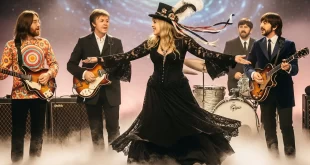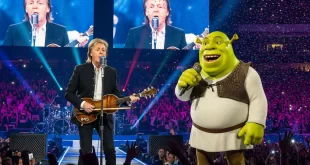George Harrison in Cannes in 1976
George Harrison in Cannes in 1976 / Michael Putland / Getty Images
Alicia Sanchez gomez

31/08/2021-15:21 CET 4 ‘
George Harrison was baffled after hearing the guilty sentence. When he wrote My sweet lord he was unaware of the hell that would come all over him. ′′ Why didn’t I notice?” I’d say years later. On August 31, 1976, the Beatles guitarist and songwriter was found guilty of ′′ unconscious plagiarism “.
A jury ruled that the song he had debuted solo was musically similar to He’s so fine, a 1963. hit by The Chiffons. But the matter didn’t end at the time. Harrison appealed. Litigation went on for almost 30 years. We degran the long and tortuous road of My sweet lord.
Ex Beatle’s first No. 1
After the Beatles breakup in early 1970, each of the band’s components started their solo career. George Harrison wasn’t the first to release his debut album. Ringo Starr (with Sentimental Journey) and Paul McCartney (with McCartney) took the lead. Until November 1970 (in the US), Harrison didn’t release the triple LP All things must pass. The first single, the first song we could hear George singing as a solo artist was My sweet lord. And this time, when he led the charts around the world, he became the first number one of an ex Beatle.
It was his biggest hit and the most iconic song of all he recorded until a lung cancer with two metastasis in the brain ended his life on November 29, 2001. But it was also the most headaches Done.
George Harrison – My Sweet Lord
Born in Copenhagen
Harrison himself told how and when he had composed My sweet lord. In December 1969 I was with Billy Preston and Eric Clapton in Copenhagen, Denmark as guest artist of the group Delaney and Bonnie European tour. He started writing the song during a press conference that he could sneak out of.
He escaped and climbed into a room on the top floor. Picked up the guitar and played some chords around the words Hallelujah and Hare Krisha. Afterwards he showed it to the band, who helped him finish composing it at the same time as he completed the lyrics.
When he returned to London, Harrison worked with Billy Preston on his album Encouraging Words. They recorded the song for the album, which was released on Apple Records in September 1970. Preston’s version remained as one more cut from the album and did not come out as a single. Harrison had previously recorded it: both melody and lyrics and harmony.
Two months later, the Harrison version, produced by Phil Spector, was released as the first single from his debut All Things Must Pass. And that’s when he got messed up.
George Harrison – All Things Must Pass (2020 Mix / Audio)
′′ What’s the song it allegedly looks like?”
Lawsuit didn’t take long to arrive. On February 10, 1971, while My Sweet Lord was still at the top of the charts, Bright Tunes Music Corp sued George Harrison. This one, surprised, asked ′′ What’s the song he’s supposedly looking like?”. And they replied to him: He’s so fine, a song composed by Ronald Mark who recorded the female group The Chiffons in 1962 George recognized that he had actually heard that song, but he also made it clear that he had not paid much attention to it. And that the Chiffons weren’t on his mind in 1969, when he grabbed his guitar and started singing ‘ Hallelujah ‘: ′′ I was inspired by the 1968 version that The Edwin Hawkins Singers made of ‘ Oh Happy Day ‘ “.
Harrison initially tried to come to an agreement outside of court. His manager Allen Klein even offered to buy the entire Bright Tunes catalog. But the editor insisted he should give him copyright. It followed four years of ‘impasse’ during which Bright Tunes went bankrupt for business problems beyond the case.
Verdict: Guilty of ′′ unconscious plagiarism ′′
Finally, the trial was held in New York between February 23 and February 25, 1976. At that time, Klein was no longer his manager. He had become the ‘enemy’ advisor, Bright Tunes.
George Harrison attended alongside his guitar and several musical experts to support his arguments. One and the two songs were thoroughly analyzed. Harrison recalls in his autobiography ‘I, Me, Mine’: ′′ The plaintiff had enormous graphics with three notes of Theme A and four or five notes of Theme B drawn on top. And they talked about this for three days… to the point I started to believe that maybe those notes were owned “.
Verdict came August 31, 1976: Guilty of ′′ unconscious plagiarism “. Judge Owen decreed that both songs were ′′ practically identical “. And although the jury felt that Harrison had not intentionally copied, no Served as a defender. The compensation paid for Harrison, once taken into account several extenuating factors, was $ 1’6 million.
However, the litigation continued until its final conclusion in March 1998, when Harrison regained rights to the song in both UK and North America. Klein had rights in the rest of the world.
′′ Why didn’t I notice?”
Harrison would later regret: ′′ I was unaware of the similarities when I wrote the song. But when it started to sound loud on the radio and people started talking about it, that’s when I thought ‘ Why didn’t I notice? ‘. It would have been very easy to change a note here or there without affecting the feeling of the song “. And he concluded: ′′ As far as I’m concerned, the song’s effect has far exceeded any clash caused by greed and greed envy “.
The case has been called ′′ the most absurd black comedy in the annuals of rock ′′ and is ′′ undoubtedly one of the longest legal battles ever held in America




